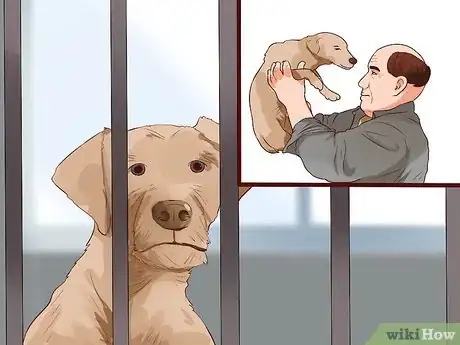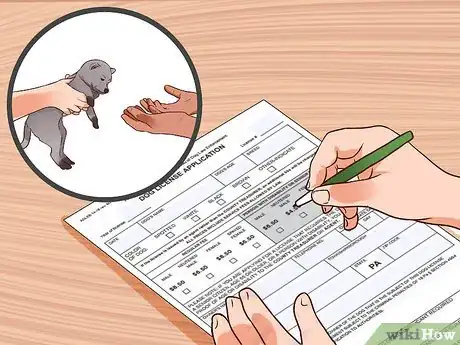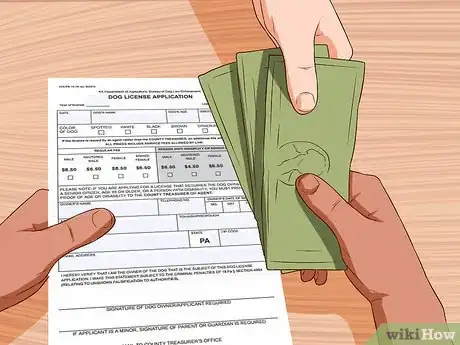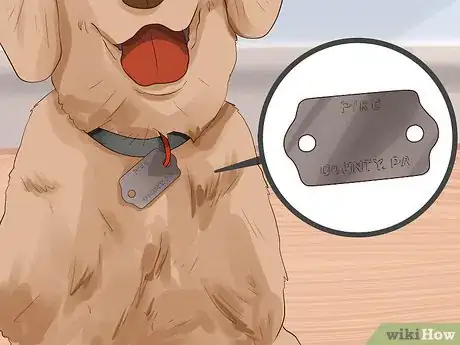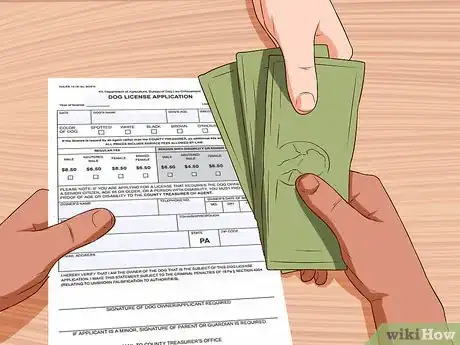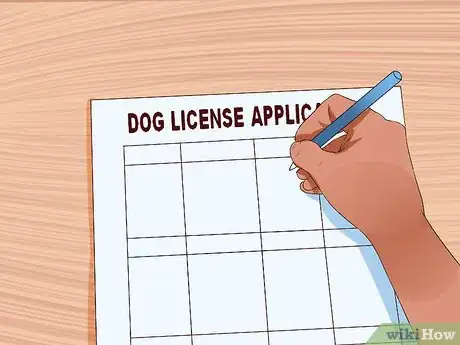This article was co-authored by wikiHow Staff. Our trained team of editors and researchers validate articles for accuracy and comprehensiveness. wikiHow's Content Management Team carefully monitors the work from our editorial staff to ensure that each article is backed by trusted research and meets our high quality standards.
This article has been viewed 74,052 times.
Learn more...
In the state of Pennsylvania, all pet owners with a dog are required to obtain a license for their dog. Dog licenses are required in Pennsylvania mainly to regulate rabies vaccinations and to identify dogs that have run away or become lost. To have your dog licensed, typically you must complete and turn in a dog license application to your local County Treasurer's office through the Pennsylvania Department of Agriculture (717-787-4737). Note that within the city of Philadelphia the licensing process works a bit differently than the rest of the state.
Steps
Learning the Dog Licensing Laws in Pennsylvania
-
1Protect your pup. If your dog gets lost and picked up by your city or county's Animal Control personnel, they are typically allowed to stay in the shelter for longer. The shelter can also use the dog's licensing information to find you and reunite you with Fido. [1]
-
2Mark your calendar. If you've just gotten a puppy, you have to get him or her licensed before they turn 3 months old. If you've gotten a new dog, you have to license him or her within 30 days. If you've just moved to Pennsylvania or moved to a new county, you have 30 days to get your dog licensed.[2]
- The law is a little different in Philadelphia. There, you can wait until your puppy is 4 months old.
Advertisement -
3Remember to renew. Unless you buy the lifetime license, you must re-register your dog every year before January 1. (The penalty for not doing so is up to $300 plus court costs!) It's not a difficult process, but it's easy to forget to do it, so make sure you have a way to remind yourself every year.
- If you use Google Calendar or some other online scheduling system, consider setting yourself a recurring reminder for early December. Then set a second one for mid-December in case you missed the first reminder.
-
4Don't rely on the old owner's license. If you've adopted a dog from someone else, there is no way to transfer the original owner's license. You will need to order a new license and provide your own information. [3]
Getting a License for a Dog in Most Pennsylvania Counties
-
1Start at the Pennsylvania Department of Agriculture website. This department houses the Bureau of Dog Law Enforcement, which is responsible for everything from dog licenses to overseeing the welfare of dogs and puppies in breeding facilities and kennels. If you live anywhere other than Philadelphia, this is your resource for dog licenses. [4]
- A simple Google search for “Pennsylvania Department of Agriculture” will bring up the website. The department is also on Facebook and Twitter. [5]
-
2Select “purchase a license from your county treasurer or issuing agent.” On the PA Department of Agriculture website, there is a link to a list of all of the county treasurers and license issuing agents in the state. Some of them have websites where you can fill out a form to get the license, but in many cases you'll have to call or email.
- If you do not have Internet access, contact the Pennsylvania Department of Agriculture to find the nearest local County Treasurer's office at 717-787-4737.
- Some counties provide you with the option to download a copy of the application to mail to your County Treasurer office.
-
3Decide whether you want an annual license or a lifetime license. If you get an annual license, you will have to renew it every year before January 1. Annual licenses may be a cheaper option if your dog is older or if you are planning on selling or giving away your dog soon. Otherwise, a lifetime license will probably be both more convenient and more cost effective in the long run.
-
4Collect the fees required to obtain a dog license. With the exception of Philadelphia, dog licenses are $8.50 for an annual license and $51.50 for a lifetime license. If your dog is spayed or neutered, the annual fee is $6.50, and the lifetime license is $31.50.
- Some counties may offer you a discount on dog licenses if you are aged 65 years or older; however, you must provide proof of age to the County Treasurer to receive the discount.
-
5Gather the information you need to complete the dog license application. Most will require your full name and address, the application will require information about your dog; including their sex, breed, color, age, and whether or not they have been spayed or neutered.[6]
- The information requested on the application may vary depending on the county you live in. Some counties may request your dog's weight, vaccination information, and microchip identification number, if applicable. [7]
- If your dog is spayed or neutered, you may have to provide proof in the form of written verification provided by a licensed veterinarian. Some counties may also require you to provide a copy of your dog's rabies vaccination certificate.
-
6Turn in your dog license application and fees to your County Treasurer office. Mail your application and fees to the County Treasurer address listed on your dog license application, or return it in person to your local County Treasurer's office.[8]
- If your county provides you with the option to obtain a dog license over the Internet, you may be required to pay an additional convenience fee. Be ready with a credit or debit card.
-
7Wait to receive your dog's license, or tag. In most cases, the county treasurer will send you a license within 10 business days, but this time frame may vary depending on the county you reside in. Be sure your dog wears the tag at all times so that they can be identified if they get lost. [9]
-
8Repeat next year! If you chose the annual option, you must renew your dog's license every year before January 1, or you could face fines. Be ready to renew in early December so that your dog is all set by the new year.
Getting a License for a New Dog in Philadelphia
-
1Start at the City of Philadelphia's licensing page. Philadelphia's requirements are slightly different from other counties. You must visit the Animal Care and Control Team of Philadelphia (ACCT Philly) website to obtain a dog license if you and your dog will reside in Philadelphia.
- You can also visit one of ACCT Philly's license retailers if you want to get the license in person. Their locations are available online. [10]
-
2Collect the fees required to obtain a dog license. Licenses for spayed or neutered dogs in Philadelphia County will cost 16 dollars; whereas licenses for dogs that are not spayed or neutered will cost 40 dollars. If you are a senior citizen (65 or older), there is a 50% discount. Service dog licenses are free in Philadelphia, but you still have to apply. [11]
- There will be a $2 fee if you pay online.
-
3Gather the information you need to get the license. In Philadelphia, your dog must have a current rabies vaccination. Though the city doesn't require proof of the vaccination, they do request it. You can get a vaccine certificate from your vet. [12]
- You'll need proof from your vet if your dog is spayed or neutered. Note that this will significantly reduce your cost in this particular location.
-
4Remember to renew. There is currently no lifetime license for dogs in Philadelphia, so you must reapply for the license every year. Prior to July 1, 2011, owners could obtain a permanent license for their dog. If this was the case for you, that license will be valid for your pup's entire life, so you don't need to worry about getting them a new license every year.[13]
Community Q&A
-
QuestionWho do you write check out to for dog license?
 Community AnswerIn most cases, to the County Treasurer's office, but call them to double check.
Community AnswerIn most cases, to the County Treasurer's office, but call them to double check. -
QuestionWhat do I need as proof of age for the senior discount?
 Community AnswerYou would need a driver's license or some other form of ID that includes your birth date on it.
Community AnswerYou would need a driver's license or some other form of ID that includes your birth date on it. -
QuestionI sent for my dog license and found out they were sent to someone else's address. The person called me and told me about this, how do I get it back?
 Community AnswerIf the person was nice enough to call you and tell you they had it, will they give it to you? If so, ask if they can drop it in the mail, or if you can go and pick it up. If they won't give it to you, call the licensing agency and tell them that they sent the license to the wrong address. Explain that you received a call from the person that has the license, etc. They should be willing to send you a replacement.
Community AnswerIf the person was nice enough to call you and tell you they had it, will they give it to you? If so, ask if they can drop it in the mail, or if you can go and pick it up. If they won't give it to you, call the licensing agency and tell them that they sent the license to the wrong address. Explain that you received a call from the person that has the license, etc. They should be willing to send you a replacement.
References
- ↑ http://license.acctphilly.org/index.php?main_page=page&id=1
- ↑ http://license.acctphilly.org/index.php?main_page=page&id=1
- ↑ http://license.acctphilly.org/index.php?main_page=page&id=1
- ↑ http://www.licenseyourdogpa.pa.gov/
- ↑ http://www.agriculture.pa.gov/Pages/default.aspx#.VwKPnYwrKRs
- ↑ http://www.licenseyourdogpa.pa.gov/
- ↑ http://www.licenseyourdogpa.pa.gov/
- ↑ http://www.licenseyourdogpa.pa.gov/
- ↑ http://license.acctphilly.org/index.php?main_page=page&id=25
About This Article
To get a dog license in Pennsylvania, start by visiting the Pennsylvania Department of Agriculture website and clicking on “Purchase a license from your county treasurer or issuing agent.” Then, select the link to your County treasurer and call or e-mail them to obtain the licensing form. Next, complete the application and turn it in along with the fees to the County treasurer’s office in person or by mail. Finally, expect to wait around 10 days to receive your dog license in the mail. For tips on how to decide between getting an annual license or a lifetime license, read on!
